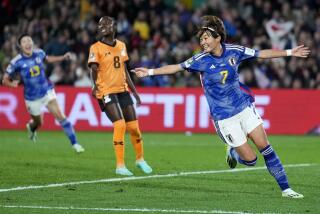WORLD CUP USA ’94 / THE FINALS : ANALYSIS : Final Four a Blend of Familiar, Unknown
- Share via
A month of competition has sorted out the two best teams in the World Cup. Italy and Brazil are three-time champions, and both are very reluctant to give up goals. They offer vastly contrasting styles.
The road to the final was different than what most experts had predicted. When the Cup moves into sudden death, the essential qualities of the teams become more decisive. These represent an amalgam of strategy, technical skill and psychological endurance. Usually, the semifinalists are established soccer powers with a long history. Thus in Italy in 1990, the semifinalists were England, Germany, Italy and Argentina--each of which had won the World Cup previously.
The current composition broke this pattern. Italy and Brazil are familiar, but Sweden had not gone this far since 1958 and had won little before or since, and Bulgaria--which qualified only at the last minute in what was wrongly considered a freak victory over France--had never before won a World Cup game. All this shows that soccer is in a state of transition and that the tactics of European soccer especially might be changing to put greater emphasis on sudden thrusts. Teams not encumbered by previous successes may be free to experiment.
Part of the reason might be technical: The draw pitted many established powers against each other in the quarterfinals, leaving several spots open for outsiders. For example, the Brazil-Netherlands game involved teams capable of winning the Cup. For Brazil, it was the “beautiful game,” led by Romario and Bebeto, that Brazil invented and that others either envy or try to imitate, the game of intricate, controlled passing and fluid, constant attack. Romario made one goal, Bebeto a second, and Branco a 28-yard free kick through the Dutch wall that clinched the game in the 81st minute.
The Netherlands, which plays the most attractive game in Europe from the spectator’s point of view, has a fascinating Cup history. It lost to Germany by one goal in the final in 1974, lost to Argentina in overtime in 1978 and lost to Germany again by one goal in the round of 16 in 1990. Its excellent players seem to lack the ultimate cohesion and discipline required for final success--though they put on a terrific show while they last. This year, of the three Brazilian goals, one was caused by an egregious defensive error, another because the Dutch defenders seemed oblivious to the new interpretation of the offside rule, whereby players not participating in the flow of the game are not considered offside.
Italy-Spain was also a contest between established soccer powers. Italy has been described as a lucky team, and in truth it had two narrow escapes--against Nigeria in the 89th minute and against Spain in the 88th. On the other hand, it cannot be an accident that Italy has given up only five goals in six games--never more than one a game. You do not see many teams with such a percentage.
Italy does not score many goals--five of its eight are the work of its great Roberto Baggio, who oscillates between brilliance and somnolence. The Italians are masters, however, at throwing the opponent off its game, inviting mistakes.
This is what happened to Spain. Until the Italy match, Spain had emphasized defense; against Italy it stressed offense--especially in the second half, most of which took place in front of the Italian goal to such an extent that it seemed only a matter of time until the dam would break and Spain would prevail. Instead Italy suddenly launched a counterattack, scoring the decisive goal in the 88th minute on a marvelous dribble by Baggio against a Spanish defense that had moved too far upfield.
In the New Jersey Meadowlands, perennial champion Germany played upstart Bulgaria. The German team had been touted before the Cup as a favorite, along with Brazil. But it never managed a convincing game. The only time the Germans looked like champions was in the first half against Belgium and South Korea. The team was too old and too lacking in coherence and perhaps commitment.
The tired and uninspired defending champions fell to a fast and furious attack by the little-heralded Bulgarians, 2-1. The Germans’ lone goal came on a penalty kick by Lothar Matthaeus. The Germans did everything right but they had neither imagination nor flair. The Bulgarians looked much more focused and also much faster. Hristo Stoitchkov tied the score with a terrific free kick in the 76th minute and three minutes later Yordan Letchkov’s header cinched the biggest upset of the tournament.
To be sure, the Germans had some excuses. For a moment in the 73rd minute the Germans thought they had a second goal, but two of their players were ruled offside, apparently correctly, in a complex interpretation best left to theological scholars. (The point was the same as the day before in the Brazil-Netherlands game--whether the player concerned, this time Rudi Voeller, was involved in the original pass toward the goal.) The gentlemanly Germans did not complain. And in truth the Germans should not have cut it so fine and would not have, had they had another choice.
The quarterfinal between Sweden and Romania brought together unseeded teams that were never expected to get there.
Both had made it the hard way: Romania had won a rousing game over Argentina; Sweden had overcome Saudi Arabia. Unfortunately the styles of the teams did not make for a great match--at least until the 79th minute. Both teams dropped back, above all concerned about preventing the opponent from scoring. Sweden played, as usual, stolidly and conservatively. Romania was waiting for Sweden to make a mistake.
Since Sweden made few attempts to assail Romania’s defenses but offered no vulnerability, the game was about as interesting as watching a cat waiting for its prey. The cat finally pounced when Sweden’s Tomas Brolin took a pass on a free kick and scored 11 minutes before the end of regulation time. Ten minutes later, Florin Raducioiu scored for Romania.
Eleven minutes into overtime Raducioiu scored again. Fourteen minutes later Kennet Andersson tied it for Sweden. A war of attrition had turned into a free-for-all.
The exhausted teams stumbled into penalty kicks, which, as the whole world knows, Sweden took 5-4 on two brilliant saves by goalkeeper Thomas Ravelli.
The semifinals left little room for abstract speculation. Italy defeated Bulgaria in a stunning display of precision soccer in a game close enough so that a lot of glory was left for doughty Bulgaria. Italy’s first half was the best of any team in the tournament: cool, precision passing and masterful finishing by Baggio.
Brazil against Sweden was much more one-sided. Brazil attacked incessantly. It had 26 shots on goal to Sweden’s three.
Nevertheless, it took Brazil until the 81st minute to score. It was curiously indecisive in completing its flamboyant maneuvers. Romario stumbled when in the clear; he seemed to want to dribble the ball into the goal; on another occasion, a Swedish defender rescued an out-of-position Ravelli on the goal line; Rai and Bebeto missed from close range. If Baggio is able to play, Brazil, for all the joy its style supplies, might not be able to defeat the tough, disciplined, cerebral Italians, who do just manage to win and seem to improve with each game.






